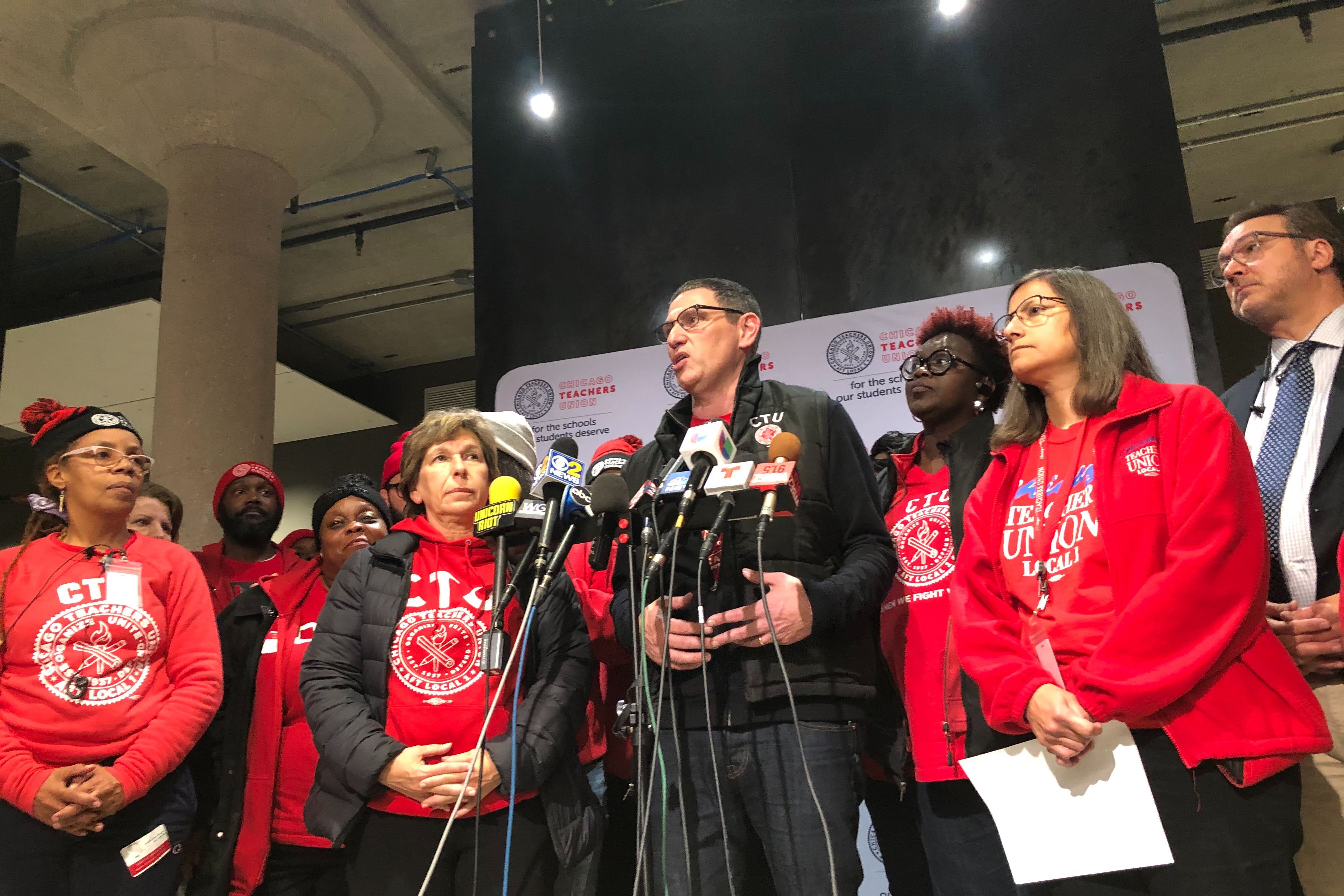A majority of Chicago’s teachers, clinicians and paraprofessionals voted to defy district orders to report to school buildings on Monday, throwing the school district’s reopening efforts into disarray.
The move, which the district has warned is an “illegal strike,” could bring most in-person learning to a halt in Chicago. Union leaders rejected the idea that the move constitutes a strike, noting that teachers plan to continue teaching virtually.
To allow more time for negotiation, district leaders said Sunday they would push back the date teachers return to buildings to Wednesday, giving the two sides more time to discuss reopening without the widespread disruption some feared. Educators for kindergarten to eighth grade previously had been told to return Monday.
District officials said Sunday the two sides “agree on far more than we disagree.”
It does not change the timeline for a broader return of elementary school students, planned for Feb. 1. Prekindergarten and special education staff already reporting to buildings will continue to do so, the district said.
Still, the back-and-forth doesn’t eliminate the possibility of a strike altogether.
“Tomorrow, we choose to work safely and remotely — together,” the union said in a statement Sunday. “If we are locked out by the mayor and CPS, then the choice to strike is theirs, not ours.”
About 3,200 prekindergarten and special education returned to school campuses two weeks ago — fewer than the district expected — and another 70,000 students in kindergarten to eighth grade are expected to return Feb. 1. A second wave of teachers had been called in to prepare classrooms starting Monday.
The union said 71% of its members voted in favor of a resolution that rejects the district directive to report to in-person work on Monday. The affirmative vote also sets in motion a potential strike if the district responds to a walkout with disciplinary action against the teachers. About 86% of teachers participated in the vote.
The union has said its goal is a written agreement with the district over working conditions.
The vote unfolded as Chicago Public Schools released new plans to prioritize teacher vaccinations at four sites starting in February. Vaccine supply has proven a challenge for public officials in every state. District leaders said that, because of supply issues, it could take months to arrange vaccinations for 40,000 employees.
The vote didn’t clear the legal boundary of 75% of members in favor required for a formal strike. But the union said that threshold didn’t count in this case because they were weighing an unfair labor strike. They set the vote margin at 60%, a number the district has challenged.
The announcement throws into chaos the second stage of the district’s reopening plan by creating major staffing uncertainty. Thousands of teachers, and some 70,000 students, are expected to return to school over the next two weeks.
Chicago Public Schools came out firmly against the plan last week, warning teachers in a letter that refusing to report to school buildings Monday would constitute an “illegal strike.”
During a Friday press conference to announce the start to the district’s push to vaccinate employees, schools chief Janice Jackson declined to say how the district would respond to a boycott of in-person teaching. She stressed again that the district considers such a move unlawful and would handle it accordingly, but balked at spelling out the district’s “legal strategy.”
“That’s a strike; that’s not a lockout,” she said when asked specifically if the district will block teachers who opt to work virtually out of their online classrooms.
Some schools have told families they are making plans to staff classrooms with non-union members to keep them open for students.
But Jackson also said a beefed-up district negotiations team will continue talks with the teachers union through the weekend.
Special education classroom aides, lunch workers and security guards, represented by SEIU Local 73, will be expected at work Monday. The local’s contract includes a no-strike clause, but in the past, those staff have refused to work in conjunction with teachers in other labor disputes.
The district has said it wants to hire 2,000 retired teachers and support staff to help fill in gaps, but has not yet filled all those positions.
The district insisted last week that an agreement with the teachers union is “within reach,” and union leaders agreed, but neither have released a draft agreement or a timeline for such a document.
In a letter to teachers, Matt Lyons, the district’s chief talent officer, expressed concern about the effect of a walkout on students who have already elected to return. “This vote would cancel in-person learning for the tens of thousands of students who asked to return — and the thousands of pre-K and cluster students who are already learning safely in classrooms,” he said.
But union leaders pushed back strongly on the district’s use of the word “strike“ and who was ultimately responsible if a work stoppage happened.
“Our members didn’t vote on a strike. They (are voting) to remain in remote learning to mitigate disaster,” said Stacy Davis Gates, the union’s vice president. “The only person who can cause a stoppage is the mayor, and CPS, if they lock our members out,” referring to the district’s decision to cut off access to email and remote learning software to about 100 educators who refused to report to campuses in the first reopening wave.
Parent surveys from December showed about 1 in 3 students planned to return when campuses reopened for pre-K and special education students this month and for K-8 students in February.
District numbers shared Friday showed that about 3,250 Chicago students returned to in-person classes in the first week of January — 60% of the attendance officials had expected.






